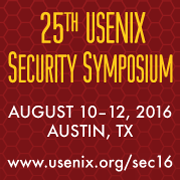The Moral Character of Cryptographic Work
Phillip Rogaway, University of California, Davis
Cryptography rearranges power: it configures who can do what, from what. This makes cryptography an inherently political tool, and it confers on the field an intrinsically moral dimension. The Snowden revelations motivate a reassessment of the political and moral positioning of cryptography. They lead one to ask if our inability to effectively address mass surveillance constitutes a failure of our field. I believe that it does. I call for a community-wide effort to develop more effective means to resist mass surveillance. I plead for a reinvention of our disciplinary culture to attend not only to puzzles and math, but, also, to the societal implications of our work.
Phil is a Computer Science professor at the University of California, Davis. He studied cryptography at MIT (1991), then worked as a security architect for IBM before joining UCD in 1994. Co-inventor of “practice-oriented provable security,” Rogaway’s work seeks to meld cryptographic theory and cryptographic practice in a mutually beneficial way.
Open Access Media
USENIX is committed to Open Access to the research presented at our events. Papers and proceedings are freely available to everyone once the event begins. Any video, audio, and/or slides that are posted after the event are also free and open to everyone. Support USENIX and our commitment to Open Access.

author = {Phillip Rogaway},
title = {The Moral Character of Cryptographic Work},
year = {2016},
address = {Austin, TX},
publisher = {USENIX Association},
month = aug
}



















connect with us